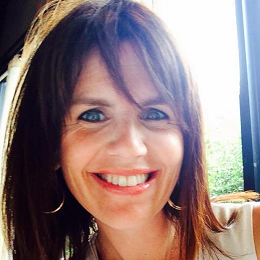
Stacy Kerr, Georgetown University
This month’s Power Points features Stacy Kerr, Assistant Vice President of Strategic Communications at Georgetown University (GU) where she is responsible for protecting, promoting and elevating Georgetown’s brand.
WWPR’s Molly Mitchell sat down with Stacy for the August edition of Power Points to learn more about how she went from nearly a decade on Capitol Hill – even being dubbed Congresswoman Nancy Pelosi’s alter ego by Politco – to GU’s Hilltop.
MM: You started in politics as a volunteer for former New Jersey Senator Bill Bradley’s 2000 Democratic presidential bid working your way up to become a paid staffer and eventually going on to be one of Congresswoman Nancy Pelosi’s closest aids for nine years. The Hill is a famously high stakes environment. What lessons did you learn from your time there?
SK: I learned the importance of a strong team. On campaigns it’s all about teams – there’s just more work then you alone could ever get done. On the Hill, I also learned the importance of humanizing policy. Finding ways to showcase stories that matter to real people. And that skill has translated in all of my jobs.
MM: Why did you decide to leave the Hill?
SK: When I left it was bittersweet. I don’t believe you should stay at a job until you’ve had enough. I think you need to push yourself to keep growing. I had this clear sense that I had this amazing experience but I wanted to make sure that the skills I was developing could translate outside politics. It wasn’t a big secret and I wasn’t leaving because I didn’t like it. I wanted a new experience to challenge myself with, to make sure I wasn’t too comfortable.

Molly Mitchell, Scott Circle
MM: What drew you to taking the position of Assistant VP of Strategic Communications at GU?
SK: When you’re on Capitol Hill it’s so relevant and each day you feel like people know what you’re doing. I didn’t want to take a job where the place was anonymous and I really found that to me GU was another venue like Capitol Hill where newsmakers could come in DC and have a trusted and unique conversation that could contribute to the larger conversation in Washington.
MM: Is there such a thing as a typical day?
SK: No, every day is different! We’re responsible for protecting and promoting the Georgetown brand. And even in the last five years what that has meant has changed so rapidly. To me, it’s really about harnessing the amazing work the University produces and translating that for our audiences. My work is truly about having an understanding about how Georgetown’s contributions can add to the local and national conversation.
MM: What is the most difficult part of your job?
SK: What I find challenging in today’s fast paced world is finding that balance between the day-to-day operations and promoting, organizing and planning for new initiatives and ideas. That’s a constant balance. Every day I have to reevaluate where I am spending my time.
MM: At the office how do you turn a negative situation into a positive one?
SK: In a word: transparency. When a less than perfect situation arises it’s crucial to just be open and honest about it. There’s no need to make it a vulnerability on your end. Share what you don’t know. There’s this sense that in communications we have all the answers. We don’t and that’s okay.
MM: What keeps you motivated?
SK: I feel a strong responsibility for my team. As much as I want to make sure that I am advancing and growing my skills, I want to make sure they are as well. Then as a working mom, I want to set an example for my kids. I’m really motivated to do my best work because when I’m at work I’m not with them. That’s motivating because my time is more precious than it used to be and anything I’m doing has to be worthwhile.
MM: I know “having it all” is such a charged phrase – but how do you balance it all?
SK: It’s hard. It’s a different set of responsibilities but it’s no harder than my friends who don’t have kids and work to find what enriches them in life outside of their job. I have responsibilities with my kids and yes, sometimes those do trump everything else and it’s easy to say children are the priority. But honestly, balance applies to everyone. Balance and having it all also means understanding what you’re comfortable with and listening to that voice. Not measuring your choices both personal and professional by what others choose.
MM: We also live a world where we are always plugged in.
SK: Right especially in communications – it’s stressful, it’s constant. I think being with family or friends or children or exercising or shopping or having a drink after work – whatever it is that brings that sense of balance into your life is really hard to figure out. I appreciate the advice I get from my friends who work and don’t have kids just as much as those who do.
MM: What do you believe is the biggest barrier to female leadership?
SK: I think it’s having a pipeline of women who are ready to be put in the C-Suite. There’s still work to be done on answering the question on whether or not women do bring a different perspective on things. I believe they do in the same way I believe that people of different economic and cultural backgrounds bring different perspectives to the table. It’s the responsibility of leaders to ensure that diverse opinions are informing their decisions.
MM: You’re active on Twitter and Instagram – what’s your advice on how to have an authentic and fun voice online?
SK: Know your audience and share things that you are really passionate about.
MM: How do digital and social trends influence your strategic planning?
SK: They have a huge impact on our planning. One of the things I’ve done at GU is to make our social and digital person a permanent position and turn our limited resources towards that. We’ve had to figure out ways to realign our resources and shift from doing print outreach to being much more digital. When we plan communications for an initiative, we work every single social platform into that sequence of events.
MM: What professional experiences have you learned from the most?
SK: How to transition from being an executer to a manager, which is no small task. Managing is a completely different set of skills.
MM: What’s your favorite thing about DC?
SK: I love DC’s neighborhoods and I love the energy and I love the people. It is a super interesting town.
MM: Most beloved DC restaurant?
SK: Aqua Al 2 on Capitol Hill and Café Deluxe. I know it’s not the fanciest but I have amazing memories of Café Deluxe from when I first moved to DC. When my girlfriends and I had our beginner jobs here, we thought it was a big deal if on a Saturday night we could go there. I’m so happy it’s still here after all these years!
MM: What’s the first thing you do in the morning?
SK: Two things: I check where my children are sleeping and I check my Instagram feed.
MM: Favorite news program?
SK: It’s such a treat whenever I can watch the evening news. But my daily go-to is CBS This Morning while I’m getting ready. I think the CBS reinvention of morning news has been brilliant and necessary.
MM: What do you ‘gram the most of?
SK: My kids and things that I think are pretty.
MM: Three things you always have in your purse?
SK: It’s a little cliché but I do think that putting on lipstick, when I’m feeling nervous or down can help. And then pens and a computer always.
MM: Finally, what advice would you give your early twenties self?
SK: Slow down and appreciate the moment that you’re in. Life comes at you fast and you’re going to have a great career, whatever that means to you. But there’s nothing like being in your early 20s and starting off because everything is available to you – you’re so limitless in opportunity. Take advantage of that!
To learn more about Georgetown University’s strategic communications team check out: https://publicaffairs.georgetown.edu/communications
Follow Stacy and Molly on Twitter: @stacykerr and @mollyemitchell



